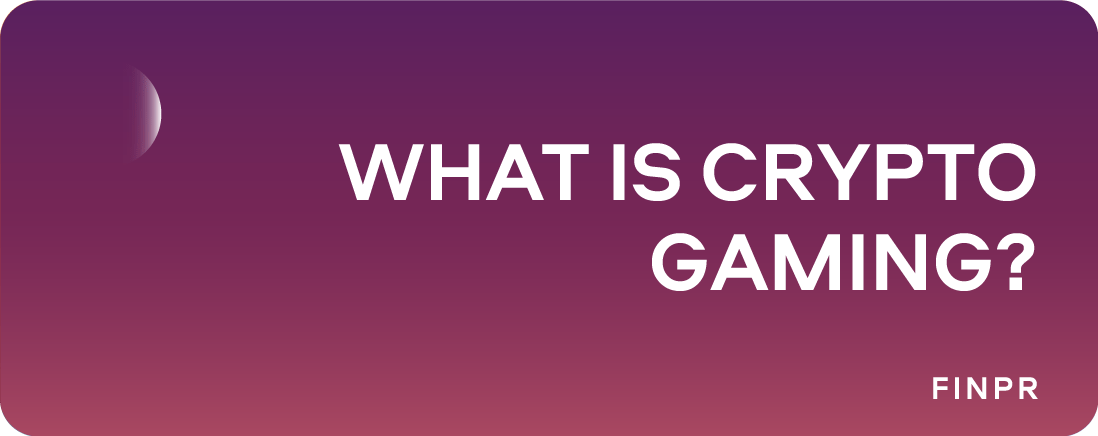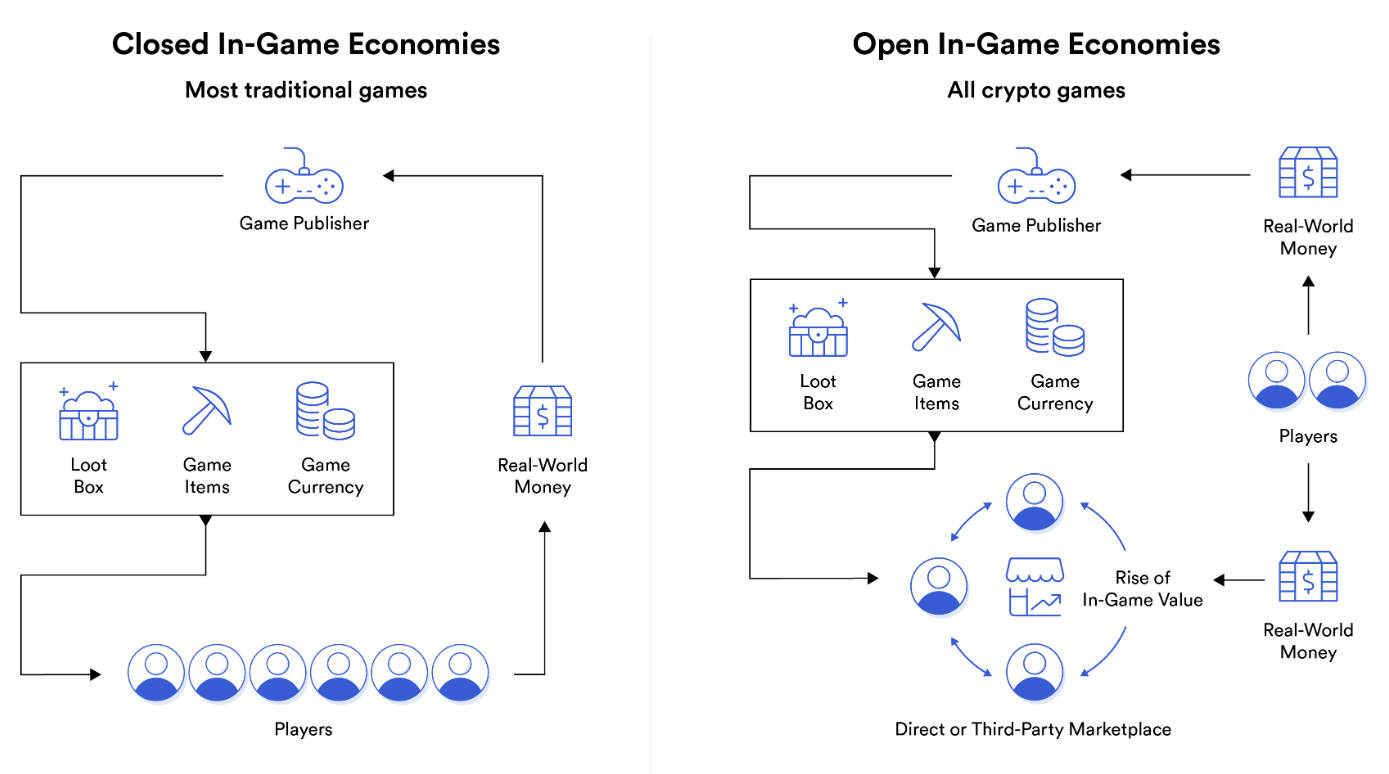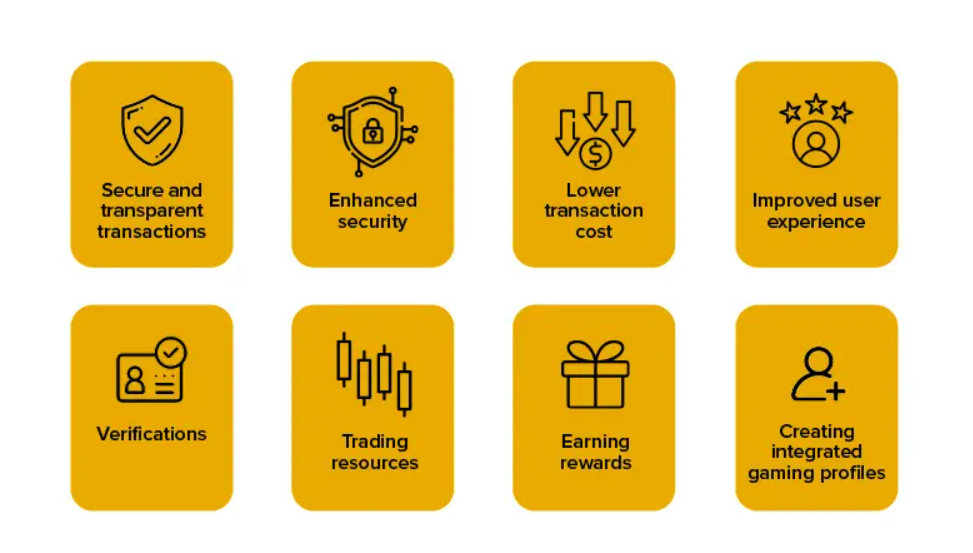
Crypto gaming is revolutionizing the gaming industry by merging with blockchain and cryptocurrency trends. It introduces play-to-earn (P2E) models, where players can earn real-world value, attracting gamers, investors, and developers. This innovation is creating new economic opportunities and redefining game design and business models.
The fusion of gaming and blockchain is transforming the industry. Blockchain allows for verifiable ownership of digital assets, secure transactions, and asset transfer between games. Crypto games enable players to earn cryptocurrency, trade NFTs, and engage in decentralized game governance, challenging traditional gaming models and redefining player-developer dynamics. We'll go into more detail about this type of gaming.
The Basics of Crypto Gaming
Gaming has evolved from simple arcade games to complex, immersive experiences on consoles, PCs, and mobile devices. Traditionally, in-game purchases were confined to the game and controlled by developers.
Since Bitcoin's creation in 2009, cryptocurrency has provided a decentralized digital currency based on blockchain technology, a secure and transparent way to manage digital assets.
Crypto gaming, or blockchain gaming, integrates blockchain technology and cryptocurrency into games, allowing players to truly own in-game assets like characters, items, and virtual land through non-fungible tokens (NFTs). These assets can be securely bought, sold, and traded on blockchain platforms.
Blockchain Technology in Gaming

Blockchain technology is the backbone of crypto gaming, providing a decentralized and secure framework for managing digital transactions. The main components of blockchain include:
- Blocks: These are units of data that contain records of transactions. Each block is linked to the previous one, forming a chain. Once data is recorded in a block, it cannot be altered retroactively without altering all subsequent blocks.
- Nodes: These are individual computers that participate in the blockchain network. Each node maintains a copy of the entire blockchain and helps verify and record transactions.
- Miners: Nodes that validate and add new blocks to the blockchain by solving complex cryptographic problems. Miners compete to solve these problems, and the first to do so adds the block to the blockchain and is rewarded with cryptocurrency.
- Consensus Mechanisms: Protocols that ensure all nodes agree on the state of the blockchain. The most common mechanisms are Proof of Work (PoW), which requires computational effort, and Proof of Stake (PoS), which requires validators to hold and lock up a certain amount of cryptocurrency.
In the context of gaming, blockchain technology enables several innovative applications:
- True Ownership: Players can own and control their in-game assets as Non-Fungible Tokens (NFTs). Unlike traditional games where assets are stored on centralized servers and controlled by game developers, blockchain allows players to truly own their items, independent of the game’s fate.
- Interoperability: Blockchain facilitates the use of digital assets across multiple games and platforms. For example, an item earned in one game could be used in another, creating a more interconnected gaming ecosystem.
- Transparency: Every transaction and change of ownership is recorded on the blockchain, providing an immutable and publicly accessible ledger. This transparency helps build trust among players and developers.
Cryptocurrency and In-Game Economies
Cryptocurrency is a digital or virtual form of currency that uses cryptography for security. Unlike traditional currencies issued by governments, cryptocurrencies are decentralized and operate on blockchain technology. Key types of cryptocurrency include:
- Bitcoin (BTC): The first and most widely recognized cryptocurrency, known for its role as a store of value and medium of exchange.
- Ethereum (ETH): Known for its smart contract functionality, which allows developers to create decentralized applications (dApps) on its blockchain.
- Altcoins: Other cryptocurrencies like Litecoin (LTC), Ripple (XRP), and many others, each with unique features and use cases.
Cryptocurrencies provide a secure and efficient way to buy, sell, and trade in-game assets. This eliminates the need for traditional payment methods and reduces transaction fees. Play-to-earn models allow players to earn cryptocurrency by engaging in gameplay. This can range from completing tasks and quests to winning battles and competitions.
Game developers can raise funds through Initial Coin Offerings (ICOs) or token sales. This democratizes the funding process and allows developers to maintain more control over their projects.
NFTs and Gaming
NFTs are unique digital assets stored on a blockchain. Unlike cryptocurrencies such as Bitcoin or Ethereum, which are fungible and can be exchanged on a one-to-one basis, NFTs are indivisible and unique. Each NFT represents ownership of a specific item, piece of content, or asset.
Players own their in-game assets as NFTs, giving them full control over how they use, sell, or trade these items. This ownership is independent of the game developers and persists even if the game shuts down. Limited edition items can be issued as NFTs, increasing their rarity and value. This mimics the real-world concept of collectibles, where scarcity drives demand.
Both developers and players can create and trade unique digital items. This opens up new avenues for creativity and personalization within games.
Examples of popular NFTs in gaming:
- CryptoKitties: One of the first games to popularize NFTs, where players breed and trade unique digital cats. Each CryptoKitty is an NFT with distinct traits and characteristics.
- Axie Infinity: A play-to-earn game where players collect, breed, and battle creatures called Axies, which are represented as NFTs. Axies can be traded on marketplaces, and players can earn cryptocurrency through gameplay.
- Decentraland: A virtual world where players can buy, sell, and trade virtual real estate and other digital assets as NFTs. Players can create and monetize their own experiences within this virtual space.
Key Components of Crypto Gaming
Play-to-Earn (P2E) Models
Play-to-Earn (P2E) is a revolutionary gaming model where players earn real-world value through gameplay. Unlike traditional gaming, where players invest time and money with no tangible returns, P2E games reward players with cryptocurrency and digital assets for their in-game activities. These rewards can be traded, sold, or used within the game ecosystem.
Players can earn through various in-game activities, including:
- Completing Tasks and Quests: Games often feature tasks and quests that reward players with cryptocurrency or NFTs upon completion.
- Battles and Competitions: Players can earn by participating in battles or competitions, with rewards distributed based on performance.
- Creating and Selling Assets: In games like The Sandbox, players can create digital assets (e.g., virtual real estate, items) and sell them to other players for cryptocurrency.
Game Development and Blockchain Integration
Integrating blockchain technology into game development involves several key steps:
- Smart Contracts: Developers create smart contracts on blockchain platforms (e.g., Ethereum) to handle in-game transactions and asset ownership. Smart contracts are self-executing contracts with terms directly written into code, ensuring secure and transparent transactions.
- Tokenization: In-game assets are tokenized as NFTs, providing unique digital ownership. Developers create tokens that represent game items, characters, and other assets.
- Decentralized Marketplaces: Developers build decentralized marketplaces where players can trade NFTs and other digital assets. These marketplaces operate on blockchain technology, ensuring secure and transparent transactions.
The integration of blockchain technology, the emergence of play-to-earn models, and the development of decentralized platforms are reshaping the gaming industry, offering new opportunities and experiences for players worldwide.
Benefits and Challenges of Crypto Gaming
Benefits

Ownership and Control:
- Crypto gaming enables players to have true ownership of in-game assets through non-fungible tokens (NFTs). Unlike traditional games where assets are owned by the developers, NFTs allow players to buy, sell, and trade their assets freely.
- Assets in crypto games can often be transferred between different games and platforms, increasing their utility and value.
Monetization Opportunities:
- Crypto games often incorporate play-to-earn models, allowing players to earn cryptocurrency or NFTs by participating in the game. This can provide a source of income, especially in regions with limited economic opportunities.
- These games create decentralized in-game economies where players can trade assets without a central authority, often resulting in more dynamic and engaging markets.
Transparency and Security:
- The use of blockchain ensures that all transactions are transparent, immutable, and secure. This reduces the risk of fraud and cheating, as every action is recorded on a public ledger.
- Automated smart contracts can manage transactions and rewards distribution, reducing the need for intermediaries and ensuring fair play.
Innovation and Community Engagement:
- The integration of blockchain technology allows for innovative game mechanics that are not possible in traditional games, such as decentralized governance and staking mechanisms.
- Many crypto games involve their community in the development process, often through decentralized autonomous organizations (DAOs). This ensures that the game evolves in a direction that aligns with the interests of its players.
Challenges
Technical Complexity:
- For many players, the technical aspects of blockchain, cryptocurrency, and NFTs can be daunting. This can limit the accessibility of crypto games to a broader audience.
- Despite blockchain's security, there are still risks associated with digital wallets, private keys, and smart contract vulnerabilities. Players must be vigilant to protect their assets.
Regulatory Uncertainty:
- The regulatory environment for cryptocurrencies and NFTs is still evolving. This uncertainty can lead to sudden changes in the legality of certain games or transactions, which can affect players and developers.
- Earnings from crypto games may be subject to complex tax regulations, varying significantly by jurisdiction, which can be a significant burden for players.
Economic Volatility:
- The value of in-game assets and cryptocurrencies can be highly volatile. Players may experience significant gains or losses due to market fluctuations, which can affect their gaming experience and financial well-being. In a bundle of GameFi marketing with a good game infrastructure, your project can attract the attention of thousands of players.
- The potential for high returns can attract speculators rather than genuine players, which can distort the in-game economy and affect the overall gaming experience.
Scalability and Performance:
- Popular blockchain networks can become congested, leading to high transaction fees and slow processing times. This can negatively impact the gameplay experience.
- While various scalability solutions are being developed, such as layer 2 protocols and sidechains, they are still in their early stages and not universally adopted.
Environmental Concerns:
- Many blockchain networks, particularly those using proof-of-work consensus mechanisms, consume significant amounts of energy. This raises environmental concerns and can lead to negative public perception.
Crypto gaming presents a host of exciting opportunities. However, it also faces significant challenges. As the industry continues to evolve, it will be crucial to address these challenges to unlock the full potential of crypto gaming.
Navigating the Crypto Gaming Community
Importance of Community in Crypto Gaming
The community is a vital aspect of crypto gaming, providing support, resources, and opportunities for collaboration and learning. Engaging with the community can enhance your gaming experience and help you stay informed about the latest developments. On the other hand, good projects always manage their communities to wide their users’ base.
How to Connect with Other Players and Developers
- Join Online Forums and Social Media Groups: Participate in forums like Reddit, Discord channels, and Telegram groups dedicated to your chosen games and blockchain gaming in general.
- Attend Virtual and In-Person Events: Engage with the community through virtual meetups, webinars, and industry conferences. These events provide opportunities to network with other players and developers.
- Follow Influencers and Thought Leaders: Stay updated by following influencers, developers, and thought leaders in the crypto gaming space on platforms like Twitter and YouTube.
- Contribute to Community Projects: Get involved in community-driven projects, contribute to discussions, and share your experiences and insights to build your reputation and connections within the community.
Summing Up
Crypto gaming is a transformative force that merges the exciting world of video games with the innovative technologies of blockchain and cryptocurrency. This integration provides players with unprecedented ownership and control over digital assets, enables new economic opportunities through play-to-earn models, and offers enhanced security and transparency in gaming transactions.
As blockchain technology continues to evolve and mature, the possibilities for crypto gaming are boundless. Innovations in cross-chain compatibility, scalability solutions, and decentralized governance are likely to further enhance the gaming experience and expand the reach of crypto games to a broader audience.
For those intrigued by the potential of crypto gaming, now is an opportune time to explore and engage with this exciting frontier. Start by researching and selecting games that align with your interests, setting up a secure digital wallet, and joining the vibrant communities that drive this industry forward. By actively participating, you can gain firsthand experience, potentially earn valuable rewards, and be part of a revolutionary movement in the gaming world.




